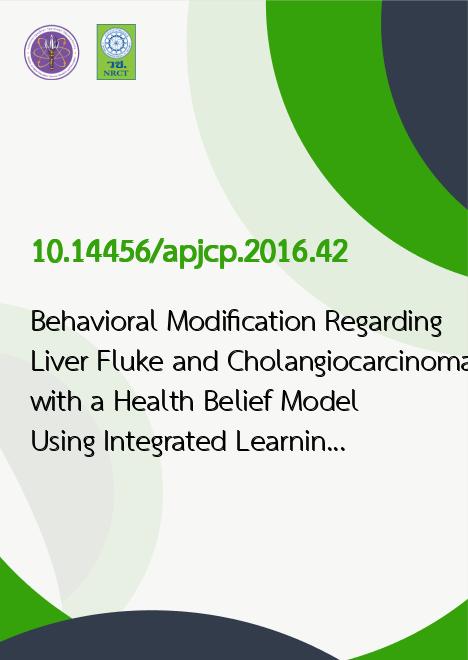
|
Behavioral Modification Regarding Liver Fluke and Cholangiocarcinoma with a Health Belief Model Using Integrated Learning |
|---|---|
| รหัสดีโอไอ | |
| Creator | Panida Phatisena, Tawatchai Eaksanti, Pitsanee Wichantuk, Jaruwan Tritipsombut, Soraya J Kaewpitoon, Ratana Rujirakul, Parichart Wakkhuwattapong, Wakkhuwattanpong, Taweesak Tongtawee, Likit Matrakool, Sukij Panpimanmas, Jun Norkaew, Jirawoot Kujapun, Wasu |
| Title | Behavioral Modification Regarding Liver Fluke and Cholangiocarcinoma with a Health Belief Model Using Integrated Learning |
| Publisher | APJCP |
| Publication Year | 2559 |
| Journal Title | Asian Pacific Journal of Cancer Prevention |
| Journal Vol. | 17 |
| Journal No. | 6 |
| Page no. | 2889-2894 |
| Keyword | Behavioral modification, liver fluke, cholangiocarcinoma, integrative learning |
| Abstract | This study aimed to modify behavior regarding liver fluke and cholangiocarcinoma prevention in Chumphuang district, Nakhon Ratchasima province, Thailand through integrated learning. A total of 180 participants were included through purposive selection of high-risk scores on verbal screening. Participants attended the health education program which applied the health belief model included family based, knowledge station based, academic merit based and community based learning. Data were collected using a questionnaire composed of 4 parts: 1) personal information, 2) knowledge, 3) perceived susceptibility, severity, benefits, and barriers, 4) practice regarding liver fluke and cholangiocarcinoma prevention. The result revealed that the majority were female (79.9%), age _ 60 years old (33.2%), primary school educational level (76.1%), and agricultural occupation (70.1%). The mean scores of knowledge, perception, and practice to liver fluke and cholangiocarcinoma prevention, before participated the integrative learning were low, moderate, and low, respectively. Meanwhile, the mean score of knowledge, perceived susceptibility, severity, benefits, and barriers, and practice regarding liver fluke and cholangiocarcinoma prevention, were higher with statistical significance after participation in the integrated learning. This finding indicates that health education programs may successfully modify health behavior in the rural communities. Therefore they may useful for further work behavior modification in other epidemic areas. |